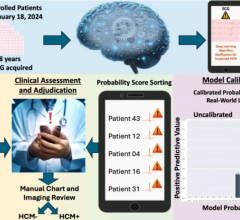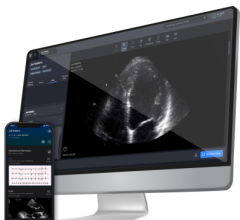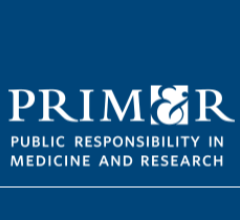
Feb. 25, 2025 — Heartflow, Inc., a provider of AI technology for coronary artery disease (CAD) management, recently introduced its new brand identity reflecting its focus on delivering clarity, precision and confidence in the prevention, diagnosis and treatment of CAD.
 This updated identity represents a new era for Heartflow, reinforcing the company’s leadership in providing clinicians with decisive insights to manage CAD throughout patients’ lives. Heartflow has helped clinicians manage more than 400,000 patients worldwide and is striving to make a difference for the millions of patients whose lives are impacted by CAD every year.
This updated identity represents a new era for Heartflow, reinforcing the company’s leadership in providing clinicians with decisive insights to manage CAD throughout patients’ lives. Heartflow has helped clinicians manage more than 400,000 patients worldwide and is striving to make a difference for the millions of patients whose lives are impacted by CAD every year.
“At Heartflow, we are working toward a new vision to transform coronary artery disease from the leading cause of death to a disease that can be managed for life,” said John Farquhar, president and CEO of Heartflow. “With our AI-driven technology, we’re doing more than diagnosing CAD – we’re equipping clinicians with the insights needed to develop personalized treatment plans to provide the best possible care to each patient. We’re excited about the future, where Heartflow is positioned to help physicians identify CAD earlier and guide patients toward a lifetime of better health.”
Heartflow’s new branding will be rolled out across all company materials, product interfaces, social media channels and the Heartflow.com website. The new brand identity and materials reflect input collected from Heartflow customers and cardiovascular community stakeholders. A key element of Heartflow’s approach is close collaboration with clinical teams to improve patient experiences, create efficient care pathways and reach more patients with personalized insights, ensuring the best possible outcomes.
In the U.S., CAD is estimated to be responsible for one heart attack every 40 seconds and one out of every five deaths.1 Many of the estimated 18 million adults in the U.S. and 315 million people globally living with CAD either have no symptoms or symptoms that go unrecognized.2, 3 Heartflow is working to ensure that its technology not only helps clinicians see CAD earlier but also transforms how they understand and manage the disease.
Coronary computed tomography angiography (CCTA) was a major advancement in CAD diagnostics, helping physicians estimate if a stenosis was significant and requiring intervention. Technologies like Heartflow fractional flow reserve computed tomography (FFRCT) provide lesion-specific physiology, which enhances CCTA’s diagnostic accuracy. Now Heartflow Plaque Analysis leverages AI to quantify and characterize the amount and type of plaque present in the arteries from a single CCTA scan. These advancements provide physicians with more precise, personalized insights into heart health, aiding in treatment planning and identifying individuals at high risk of major adverse cardiovascular events (MACE), such as heart attacks, which can occur in patients with and without symptoms of CAD.
Heartflow is dedicated to defeating CAD by partnering with physicians to generate robust, high-quality clinical evidence. Heartflow has been adopted by more than 1,400 institutions globally and continues to strengthen its commercial presence to make its cutting-edge solutions more widely available to an increasingly diverse patient population worldwide.
For more information on the company and and cardiovascular care, please visit www.heartflow.com.
References
- Centers for Disease Control and Prevention. Heart Disease Facts. https://www.cdc.gov/heart-disease/data-research/facts-stats. Accessed Feb. 18, 2025.
- Cleveland Clinic. Coronary Artery Disease. https://my.clevelandclinic.org/health/diseases/16898-coronary-artery-disease. Accessed Feb. 21, 2025.
- Stark, B, Johnson, C, Roth, G. Global Prevalence of Coronary Artery Disease: An Update From The Global Burden of Disease Study. JACC. 2024 Apr, 83 (13_Supplement) 2320. https://doi.org/10.1016/S0735-1097(24)04310-9


 September 24, 2025
September 24, 2025 









